

News/P55-07.txt. Most of you steal your software. On February 3rd of 1976, almost 10 years before unveiling Windows 1.0, an irate young Bill Gates wrote the following open letter in response to piracy of Altair BASIC, a piece of software Gates had produced with Paul Allen and Monte Davidoff, and which was essentially the first such release from Microsoft (then named Micro-Soft).

The letter was published in a number of leading computer publications and caused quite a stir. Interestingly, initial versions of the software itself pre-dated the widespread introduction of floppy disks, and as such it was released on paper tape — hence this photo of Altair BASIC 8K. Transcript follows. (Source: DigiBarn; Image: Bill Gates, via.) Transcript February 3, 1976An Open Letter to Hobbyists To me, the most critical thing in the hobby market right now is the lack of good software courses, books and software itself. Yak Shaving. "Yak shaving.
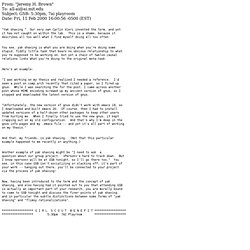
" Our very own Carlin Vieri invented the term, and yet it has not caught on within the lab. This is a shame, because it describes all too well what I find myself doing all too often. You see, yak shaving is what you are doing when you're doing some stupid, fiddly little task that bears no obvious relationship to what you're supposed to be working on, but yet a chain of twelve causal relations links what you're doing to the original meta-task. Here's an example: "I was working on my thesis and realized I needed a reference. "Unfortunately, the new version of gnus didn't work with emacs 18, so I downloaded and built emacs 20. Tim Berners-Lee, Geek of the Week.
Simple-Talk's Geek of the Week is Sir Timothy John Berners-Lee OM KBE FRS FREng FRSA. , ranked first in The Telegraph's list of 100 greatest living geniuses, and director of the World Wide Web Consortium.
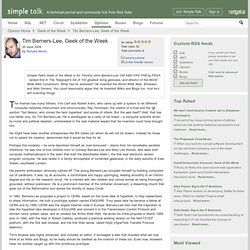
What has he achieved? He invented the World Wide Web, Browsers and Web Servers. You could reasonably argue that he invented Wikis and Blogs too. And he's still inventing things. The Internet has many fathers: Vint Cerf and Robert Kahn, who came up with a system to let different computer networks interconnect and communicate; Ray Tomlinson, the creator of e-mail and the '@' symbol; Ted Nelson, who coined the term hypertext; and scores of others.
Bad CaRMa. ----Editor's Note----I was Tim's editor at Apress when he wrote this piece for the book, Oracle Insights: Tales of the Oak Table.
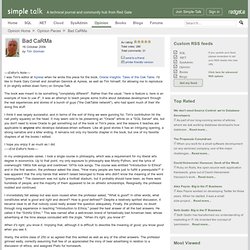
I'd like to thank Gary Cornell and Jonathan Gennick at Apress, as well as Tim himself, for allowing me to reproduce it (in slightly edited down form) on Simple-Talk. The book was meant to be something "completely different". Rather than the usual, "here is feature x, here is an example of how to use it", it was an attempt to teach people some truths about database development through the real experiences and stories of a bunch of guys ("the OakTable network"), who had spent much of their life doing this stuff.
Linux kernel. The Linux kernel is released under the GNU General Public License version 2 (GPLv2)[6] (plus some firmware images with various non-free licenses[8]), and is developed by contributors worldwide.
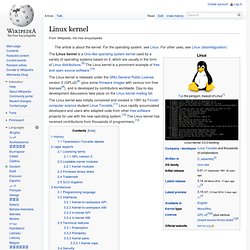
Day-to-day development discussions take place on the Linux kernel mailing list. The Linux kernel was initially conceived and created in 1991 by Finnish computer science student Linus Torvalds.[11] Linux rapidly accumulated developers and users who adapted code from other free software projects for use with the new operating system.[12] The Linux kernel has received contributions from thousands of programmers.[13] History[edit] In April 1991, Linus Torvalds, a 21-year-old student at the University of Helsinki, Finland started working on some simple ideas for an operating system. He started with a task switcher in Intel 80386 assembly language and a terminal driver. After that, many people contributed code to the project. In December 1991, Linux 0.11 was released. Tanenbaum–Torvalds debate[edit] Numbers Every Programmer Should Know By Year. VLC cone: why? Meme, Counter-meme (Godwin by Godwin) Meme, Counter-meme By Mike Godwin It was back in 1990 that I set out on a project in memetic engineering.
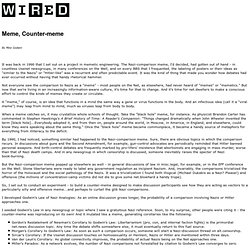
The Nazi-comparison meme, I'd decided, had gotten out of hand - in countless Usenet newsgroups, in many conferences on the Well, and on every BBS that I frequented, the labeling of posters or their ideas as "similar to the Nazis" or "Hitler-like" was a recurrent and often predictable event. It was the kind of thing that made you wonder how debates had ever occurred without having that handy rhetorical hammer. Not everyone saw the comparison to Nazis as a "meme" - most people on the Net, as elsewhere, had never heard of "memes" or "memetics.
" A "meme," of course, is an idea that functions in a mind the same way a gene or virus functions in the body. The WELL. Net Legends FAQ. NET.WARS.